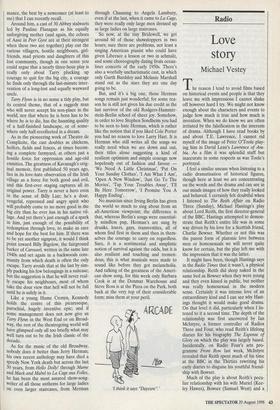Radio
Love story
Michael Vestey
The reason I tend to avoid films based on historical events and people is that they leave me with impressions I cannot shake off however hard I try. We might not know enough about the characters and events to judge how much is true and how much is invention. When we do know we are often irritated by the falsification in the interests of drama. Although I have read books by and about T.E. Lawrence, I cannot rid myself of the image of Peter O'Toole play- ing him in David Lean's Lawrence of Ara- bia. As a film it was splendid stuff but inaccurate in some respects as was Toole's portrayal.
I feel a similar unease when listening to a radio dramatisation of historical figures, though here at least we are concentrating on the words and the drama and can see in our minds images of how they really looked and behaved. I certainly felt doubtful when I listened to The Reith Affair on Radio Three (Sunday), Michael Hastings's play about Lord Reith, the first director-general of the BBC. Hastings attempted to demon- strate that Reith's entire life was in some way driven by his love for a Scottish friend, Charlie Bowser. Whether or not this was the purest form of platonic love between men or homosexuals we will never quite know for certain, but the play left me with the impression that it was the latter.
It might have been, though Hastings says in the Radio Times that it wasn't, a physical relationship. Reith did sleep naked in the same bed as Bowser when they were young and they even kissed in public, but neither was really homosexual in the modern sense. Certainly it was intense love of an extraordinary kind and I can see why Hast- ings thought it would make good drama. On that level it did, particularly when I lis- tened to it a second time. The depth of the relationship was first uncovered by Ian McIntyre, a former controller of Radios Three and Four, who read Reith's lifelong diaries for his biography The Expense of Glory on which the play was largely based. Incidentally, on Radio Four's arts pro- gramme Front Row last week, McIntyre revealed that Reith spent much of his time at the BBC in the Thirties rewriting his early diaries to disguise his youthful friend- ship with Bowser.
Much of the play is about Reith's pecu- liar relationship with his wife Muriel (Kee- ley Hawes), Bowser (Samuel West) and a woman called Maysie (Tracey Wiles). According to McIntyre, Maysie didn't exist. This means that a significant ingredient of the plot is dramatic invention which for me rather nullifies the impression of Reith that was being offered. I would have thought that in purely dramatic terms there was enough interest in Reith's relationship with Muriel and Bowser to fill a play without introducing Maysie to make Reith appear even stranger than he really was. And, for all that he achieved at the early BBC, Reith was strange: a Presbyterian tyrant, driven more by his monstrous ego than his youth- ful love for Bowser.
John Sessions played him with the brisk certitude that Reith exhibited throughout his life before bitterness set in at his failure to achieve high government office, and I thought Hawes as Muriel was outstanding. There were some irritations. The actor who played Churchill hammed it up too much and when Reith summons a member of his BBC staff and says to him, 'Peter Eckers- ley, chief engineer,' it jarred; there are less obvious ways of introducing a character in radio drama. I also thought that too much of Reith's life was crammed into the play. Having said that, in many ways Peter Kavanagh's production was curiously grip- ping.
I sometimes wonder what Reith would make of the BBC of today and the idea occurs to me for another play about him. It would be Reith sitting in front of the televi- sion watching BBC 1 on a Saturday evening or listening to Radio One and to Veg Talk on Radio Four. Think what a dramatist could make of that. I notice from newspa- per reports that Radio Four's listening fig- ures have fallen by 15 per cent since the controller James Boyle revamped the schedules. This revelation, apparently from leaks, might be a seasonal blip but I suspect not. I find myself switching off or retuning much more frequently than I did.
So many of the changes and new pro- grammes don't work at all well, the quiz shows, the numerous discussion pro- grammes, the patronising mateyness of pre- senters and duds like Broadcasting House on Sunday mornings (shouldn't it be called Stage Six, the name of the building at Tele- vision Centre where it's now broadcast from?); hitherto loyal listeners are giving up on the network. The policy doesn't appear to be attracting the new listeners Boyle wants which comes as no surprise.



























































 Previous page
Previous page